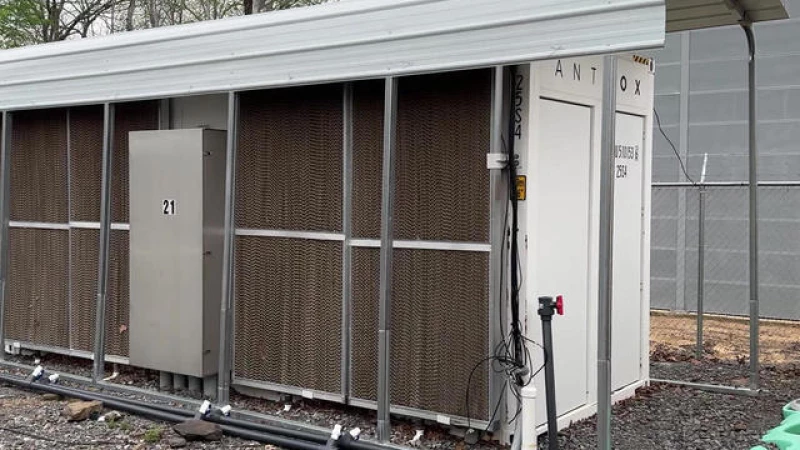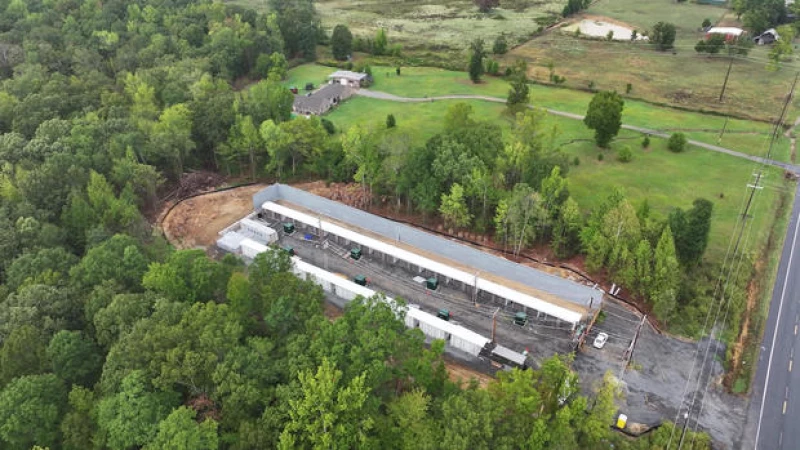Seven years ago, Gladys Anderson fulfilled her dream of owning a home in Bono, Arkansas, seeking peace and quiet away from the hustle and bustle of town life.
However, tranquility turned into turmoil last May when a relentless noise disrupted the serenity she cherished. Describing it as a form of military-grade torture, Anderson revealed the source to be the sound of 17,000 computer fans operating in a nearby bitcoin facility.
Concerned neighbor Shane Markuson began monitoring the noise levels, noting that the decibel readings reached as high as eighty-two. For context, a hair dryer typically registers at ninety decibels, highlighting the intensity of the disturbance.
The incessant noise has taken a toll on the well-being of residents, affecting Markuson's hearing, blood pressure, and his partner's health, who suffers from migraine headaches due to the constant disturbance.
Despite the distress caused, relocating is not a viable option for the residents. Markuson expressed his doubts, questioning who would be willing to purchase a property subjected to such disruptive noise.
Anderson recounted her efforts to address the issue, reaching out to various officials, including the county judge's office, the county administrator, and even the governor's office. She emphasized that numerous individuals have also lodged complaints about the noise pollution.
When asked about the lack of action taken, Anderson pointed to a single factor: "Money. It's money."
And it is money, specifically cryptocurrency.
Bitcoin operates as a decentralized digital currency, without the need for a central bank. Transactions are verified by networks of computers, managed by individuals known as miners. These miners are periodically rewarded with newly created bitcoins, valued at hundreds of thousands of dollars, as an incentive for maintaining the network.
However, the energy consumption of these computer systems is substantial, leading to significant noise levels.
Recently, an Arkansas bill known as the "Right to Mine" bill was passed, prohibiting local authorities from imposing regulations on these mining operations.
Republican State Senator Joshua Bryant, the primary supporter of the bill, highlighted the state's business-friendly environment, affordable land, and low-cost power as factors attracting the cryptocurrency industry.
While Bryant anticipated economic benefits from bitcoin mining, there have been unintended issues. Some mining operations have caused disturbances to neighboring communities, impacting their quality of life. Bryant acknowledged that not all bitcoin facilities create noise disturbances.
Arkansas Bitcoin miner Ben Smith emphasizes that mining plants can be very quiet – cooled by water instead of fans, built far from residential areas, and fully enclosed, rather than open-air. "I would say roughly probably half the sites in Arkansas are owned by the per se bad actors," said Smith. "It's all about design and, honestly, how much money you're gonna put in to be a good neighbor or good actor."
So, who's building all of those cheap, noisy plants? Senator Bryant says it's a web of Chinese companies
But the Chinese government isn't the only invisible hand here. The "right to mine" bill itself was drafted by a bitcoin advocacy group, the Satoshi Action Fund, that's pushing similar bills in at least 12 other states.
In Arkansas, at least 50 bitcoin mining plants are planned, and even Senator Bryant concedes that his bill needs fixing. "We are looking at a state law that will, you know, ultimately require these crypto operations to not generate noise," he said.
Meanwhile, Gladys Anderson and her neighbors are suing. "We've set up a GoFundMe; we've done some raffles," she said. "We most recently sold smoked pork butts."
The Bono plant's lawyers say that the volume is within local limits, and said in a statement to "CBS Sunday Morning" that "Our client is currently developing design plans to fully enclose the site … within a matter of months."
Despite setbacks, Gladys Anderson remains resolute: "I am a very stubborn woman, and I'm a very scornful woman," she said. "I will become just as big of a headache for them, because they're setting up everywhere."
For more info:
- Arkansas State Senator Joshua Bryant
- Crypto investor Ben Smith on Twitter/X
- Docket: Anderson v. Newrays One LLC (Court Listener)
- Arkansas Blockchain Council
Story produced by Amol Mhatre. Editor: Mike Levine.
See also:
- "Crypto for dummies": The how, what and why of using virtual currency ("Sunday Morning")
- Bitcoin mining and its environmental costs ("Sunday Morning")
- Bitcoin billionaires Cameron and Tyler Winklevoss ("Sunday Morning")








